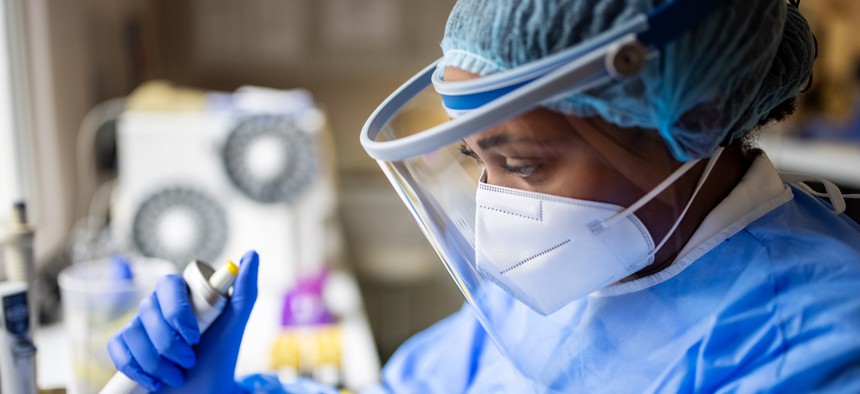Big City Health Departments Warn of Major Epidemiologist Shortage

Getty Inages/Luis Alvarez
“There’s been a significant loss of people leaving the workforce,” says the head of a group that represents the agencies.
Public health departments from the nation’s major cities on Thursday called for additional federal funding to hire more epidemiologists, saying that the number of vacant positions to collect and analyze data on Covid-19 and other health problems has doubled since 2017.
“Cities need far more epidemiologists to get the job done,” said Janet Hamilton, executive director of the Council of State and Territorial Epidemiologists, which echoed the call for more federal help.
In a report released Friday morning by the council and the Big Cities Health Coalition, 26 health departments, which provide public health for 62 million Americans combined, said they have 177 vacant positions for epidemiologists, compared to only 83 in 2017.
“There’s been a significant loss of people leaving the workforce,” said Chrissie Juliano, executive director of the Big Cities Health Coalition, which represents 30 health departments in cities with a population of at least 500,000.
“Most recently during Covid, there’s been a large amount of burnout and it’s becoming a big challenge,” she said.
But even if cities were to fill all their vacancies, that could still be short of what's needed. According to the study, the 26 health departments said they currently employ 1,284 full-time equivalent epidemiologists. To be fully staffed they would need to increase that number by half, or 602.
Already understaffed, epidemiologists in major cities have been overwhelmed during the pandemic, said Mysheika Roberts, the health commissioner in Columbus, Ohio, and chairwoman of the coalition of health departments.
Roberts said she had seen about 40 cases of infectious diseases a day before Covid. But the number has jumped to around 1,000 a day during the pandemic.
“That’s 1,0000 new cases a day, where people have to be interviewed, the data entered into a database and the numbers crunched. We went from 40 to 1,000,” she said.
“The volume of work is huge,” she said. “My staff is so tired.”
Roberts said that while her department has been able to produce daily reports on the number of new coronavirus cases to guide city officials on responding to the crisis, other cities’ health departments have only been able to produce reports two or three times a week.
In addition, departments have had to reassign epidemiologists from tracking and analyzing data to address other health problems like gun violence, she said.
A key problem, Juliano said, is that a lack of federal funding has put too much of the burden of paying for epidemiologists on cities.
According to the report, about a third of the cities’ funding for epidemiologists comes from the local level, while only 18% comes from the federal government. However, the federal government funds two-thirds of the cost of employing state epidemiologists.
“It’s really putting that burden on making sure you have sufficient resources on the cities, which is challenging,” Juliano said.
To make matters worse, about a quarter of the cities’ funding for epidemiologists is coming from federal coronavirus relief packages.
“The emergency is going away. It’s dwindling and presenting a funding cliff,” Roberts said.
The nation could be facing a broader funding shortage as it deals with the pandemic, as Politico reported this week.
Health and Human Services Secretary Xavier Becerra told congressional lawmakers that his department needs at least $30 billion for costs like Covid treatments and vaccines, testing, covering care for the uninsured, vaccine development and to fund the Centers for Disease Control and Prevention’s public health surveillance work.
While the administration anticipates it has enough vaccines and therapeutics to make it through the current virus surge, the news report said, it doesn’t currently have enough money to respond if another dangerous variant emerges.
Kery Murakami is a senior reporter for Route Fifty based in Washington, D.C.
NEXT STORY: Philadelphia launches digital equity plan






